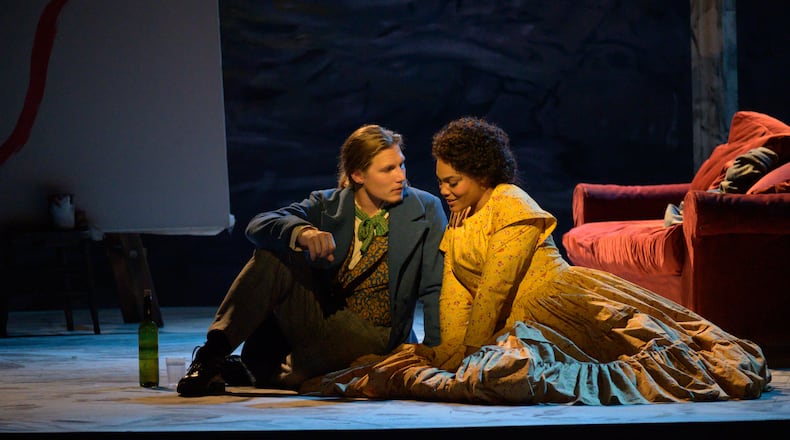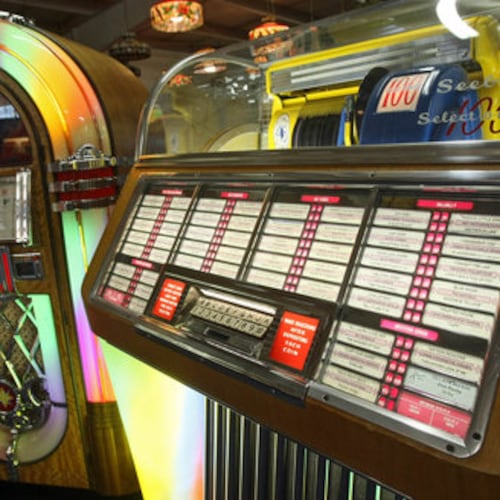When it comes to opera, Spoleto USA is a place for experimentation, for exploring and expanding the art form — an approach that goes back to Gian Carlo Menotti, who founded the festival. The new general director, Mena Mark Hanna, has doubled down on the concept of building a season around a single theme. Both of these ideas, along with the politics of the moment, have come together in this summer’s three opera presentations.
The most anticipated of these has definitely been the world premiere of “Omar,” the moving opera by Rhiannon Giddens and Michael Abels (see our review HERE). But also featured this year are Puccini’s “La Bohème” and Karim Sulayman’s “Unholy Wars.”
“La Bohème” is definitely an opera, one of the world’s most popular. This production, first seen at Detroit Opera, is the creation of Yuval Sharon, an imaginative stage director best known for his Twilight: Gods parking garage adaptation of Wagner’s “Götterdämmerung” during the pandemic. He is the only American ever to direct at the Bayreuth Festspiele in Germany. Sharon’s “La Bohème” is relatively conventional with a few very significant twists: He performed the four acts in reverse order and eliminated intermission so that, with a few cuts, it becomes a 100-minute one-act opera.
In extensive discussions surrounding the production, Sharon indicated that he wanted to free the opera from staid convention but also let it proceed “from darkness to light.” There’s a gimmick aspect to this, but it’s a fascinating experiment. If it doesn’t add great insight, it works surprisingly well, at least for opera veterans familiar with the work — by no means the majority of the audience here. With some operas you need to hear the final acts with the earlier music still echoing in your head, but “La Bohème” doesn’t seem to be in this category.
Sharon and his design team (including veteran set designer John Conklin) left the setting in 1830s Paris, with period costumes, but eliminated the sets, performing the entire opera on a rotating disc reminiscent of Wieland Wagner’s 1951 “scheibe” with a few props, especially colorful handmade signs for the children to hold in the Café Momus scene.
The young cast performed honorably in the singer-friendly Charleston Gaillard Center. Tenor Matthew White and soprano Lauren Michelle sang as Rodolfo and Michelle, respectively. Michelle’s voice is occasionally unsteady but has a wonderful ability to bloom. Soprano Brandie Sutton was a radiant Musetta. Troy Cook was an excellent Marcello.
To resolve the confusion from the reverse order and to ask probing questions, a speaking character, the Wanderer (another nod to Wagner) was added, played with dignity by opera veteran George Shirley.
This was a great night for the festival orchestra thanks to the propulsive conducting of Kensho Watanabe, who somehow crafted a big sweeping sound without ever overwhelming his singers.
Credit: Photo by Leigh Webber leighwebbe
Credit: Photo by Leigh Webber leighwebbe
“Unholy Wars”
A project of tenor Karim Sulayman, “Unholy Wars” is a pastiche opera, assembled with extracts from nine Baroque works. Original music by Mary Kouyoumdjian stitches it all together.
There’s a substantial body of Baroque opera and concert music dealing with the Crusades, always from the European Christian perspective. Sulayman has chosen some of the most sublime examples and, by cleverly arranging them and staging them with video productions and dance, uses them to show the Arab point of view, along with a strong anti-war message.
Three of the excerpts were written by Claudio Monteverdi, and his setting of the story of Tancredi and Clorinda became the evening’s core. Tancredi, a Christian knight, was in love with Clorinda, a Muslim warrior, whom he unwittingly killed in battle, failing to recognize her in the darkness beneath her armor. Shorn of Clorinda’s deathbed conversion, superbly choreographed (by Ebony Williams, with Coral Dolphin as a dancer double), and performed in front of video projections of a burning Jerusalem (by Kevork Mourad), it is a potent bit of theater. It would have resonated at any time, but war images have a special potency right now.
The final and most familiar excerpt, “Lascia ch’io pianga” from Handel’s opera Rinaldo, ends with “in my suffering, I pray for mercy,” a prayer that resonates after this meditation on “holy war.”
Kouyoumdjian’s interstitial score, all pre-recorded, effectively used drones and solfege.
The production, by Kevin Newberry, used ropes to delineate boundaries and to illustrate entanglements, both romantic and violent. Kevork Mourad’s projections often used cartoon-like drawings of ancient Middle Eastern cities as they were built, reduced to rubble, and rebuilt.
Sulayman is a superb tenor, with a natural warmth and tenderness but the ability to project harsher emotion. The female roles were sung by Raha Mirzadegan, who has a flexible soprano voice well suited to the Baroque repertoire. They were joined by bass-baritone John Taylor Ward. Ward is quite young, tall, and striking, with a distinctive and powerful sound. All three singers were dramatically effective dancers, constantly in motion along with Dolphin.
An eight-piece period instrument ensemble was ably led by Julie Andrijeski, who also played violin. The Dock Street Theatre’s famed acoustics made for a real musical feast.
Credit: WILLIAM STRUHS
Credit: WILLIAM STRUHS
Chamber Music
The chamber music programming here, by itself, would constitute one of America’s best chamber festivals. If this year’s programming seemed to have fewer marquee artists, it made up for that by introducing new ones with a carefully curated series of concerts, each featuring “something old, something new.”
As usual, there are 11 programs, each repeated 3 times, all in the Dock Street Theatre. The first of these — the only one I was able to hear — was scheduled to open with the String Sextet from Richard Strauss’ opera, “Capriccio.” Violist Leslie Robinson was unable to perform due to illness, so instead we got Mozart’s Oboe Quartet with a twist: Instead of an oboist, we got Steven Banks, who played the oboe part on his soprano saxophone. The effect was dazzling: The brighter, more resonant sound from Bank’s instrument was totally captivating. The ensemble included Geoff Nuttall on violin, Ayane Kozasa on viola, and Paul Wiancko on cello.
Kozasa returned with Wiancko to perform a newer work, Caroline Shaw’s “Limestone and Felt,” a duet for cello and viola which alternates between pizzicato and bowing to suggest the acoustic effects of various surfaces on different sounds, proceeding in an arc of discovery.
For a finale, the excellent St. Lawrence String Quartet played Mozart’s String Quartet in E-flat major, with Kozasa substituting for Robinson. Nuttall, the ensemble’s first violin, is also the “host” for the chamber programs here, which involve a rather broad comedy routine. For example, this program included a game, originally part of the festival’s outreach to local school children, where the audience was asked to shout out subjects for composition which were listed on a tablet. The musicians then conferred and improvised, with the audience left to guess which of the suggestions they’d just performed. It was entertaining, but together with the jokes and other schtick it all took up perhaps a third of the total concert time. Sometimes it’s best just to play the music, especially with such gifted artists.
The Spoleto Festival, which also includes theater, dance and jazz, among other performing arts categories, continues nonstop through June 12. Some events may be sold out, but most are still available. For full schedules and ticketing, go to the Spoleto website.
Credit: ArtsATL
Credit: ArtsATL
MEET OUR PARTNER
ArtsATL (www.artsatl.org), is a nonprofit organization that plays a critical role in educating and informing audiences about metro Atlanta’s arts and culture. Founded in 2009, ArtsATL’s goal is to help build a sustainable arts community contributing to the economic and cultural health of the city.
If you have any questions about this partnership or others, please contact Senior Manager of Partnerships Nicole Williams at nicole.williams@ajc.com.
About the Author
Keep Reading
The Latest
Featured





